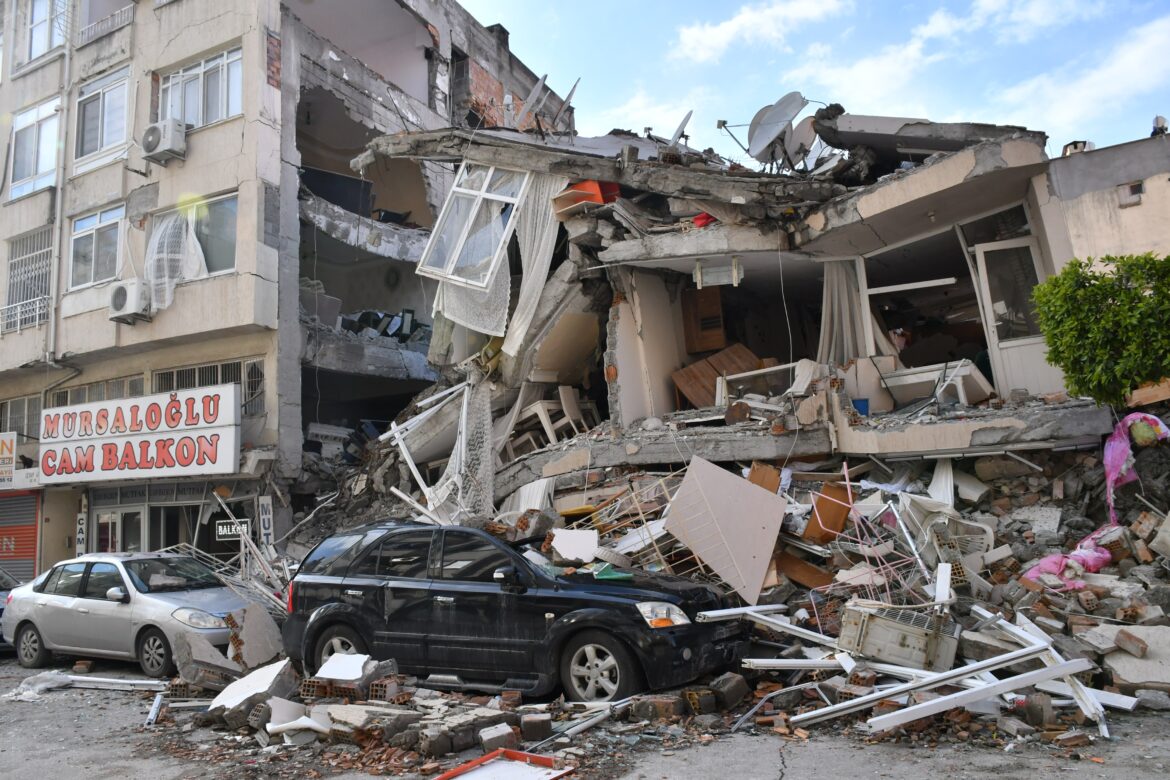On February 6, 7.8 and 7.5 earthquakes struck southern Türkiye and northern Syria, destroying all in their path and taking more than 45,000 lives in Türkiye alone. In Türkiye, more than 160,000 buildings collapsed or were severely damaged. Earthquakes occur beyond human control, but the consequences were man-made: endemic corruption and bad governance caused staggeringly high numbers of deaths.
Türkiye sits on major fault lines and is no stranger to earthquakes; a devastating earthquake in 1999 killed over 17,000. The subsequent rise of the Justice and Development Party (AKP) allowed Turkish President Recep Tayyip Erdogan to consolidate his political power around his pledge to fight against widespread corruption, dysfunctional governments, and unresponsive state institutions.
Under the rule of Erdogan and the AKP, the construction industry was the centerpiece of Türkiye’s economic growth. The economic boom enriched their political power, creating layers of corruption at the local, municipal, and national levels of governance. Much like Türkiye’s sociopolitical system, the construction industry is intertwined with corrupt networks. Erdogan enriched a close circle of associates, i.e., municipal and state officials, who issued permits for infrastructure and homes built by contractors and builders that inconsistently enforced building codes and safety regulations. It is no surprise that Türkiye’s place as 54 in Transparency International’s Corruption Perception Index in 2012 slipped 47 places to 101 in 2022.
For over 20 years, billions of dollars were collected under the government-implemented ‘earthquake tax,’ which promised to reconstruct buildings to be earthquake-resistant. Where the money was spent is unclear and remains a mystery. The government’s inadequate preventive measures are now under the spotlight as citizens and critics demand answers on its incompetent preparedness for a disaster waiting to happen. Erdogan’s authoritarian tendencies have restricted the operation of individual municipalities, cities, civil societies, and aid organisations, slowing rescue and relief efforts. Moreover, Türkiye’s Disaster and Emergency Management Authority (AFAD), a critical state agency for a country that sits on a hotbed of seismic activity, had its budget reduced significantly. In addition, the Turkish military had been greatly weakened under Erdogan, forbidding independent military response to disasters without executive instruction, which explains the troops’ slow dispatch in earthquake-struck areas.
Furthermore, the Turkish government has granted amnesty laws that pardon illegally built structures that do not meet building standards. Constructors have long overridden ordinances for quick construction and profit, enabling a mismatch between policy and practice by issuing permits in exchange for a fee paid to the government. In 2018, tightened rules on installing steel beams and columns in earthquake-prone regions were passed, only to be subverted by an amnesty law, the most recent and biggest of the kind, pardoning almost 7.4 million buildings and yielding $4.2 billion in government revenue. Estimates from tens of thousands to hundreds of thousands of buildings received construction amnesties in the affected regions of Türkiye. In Türkiye, more than 13 million buildings contravene regulations, sustaining a vicious cycle of corruption where contractors and property owners can hasten construction processes for quick profit without expert inspection in exchange for lucrative fees paid to the government. For over 20 years, politicians in power were incentivised to enrich themselves in this ecosystem of cronyism and have failed civilians who died under unsafe and unregulated constructions that collapsed. A few days before the earthquake, a draft law granting further amnesty for construction was pending parliamentary approval.
The exposure of Türkiye’s fraudulent construction sector is not new. Erdogan and the ruling AKP now face mounting pressure to answer demands for accountability. Over 600 construction contractors and property owners are being investigated over breaches of building codes and safety regulations. Nearly 200 people have been arrested. However, investigations must go further to hold officials at the local, municipal, and national levels of government accountable, including even those within the Erdogan administration and his close circle of associates, should they be identified as responsible. As Türkiye enters the reconstruction phase, Türkiye must proceed with reconstruction, comply with construction standards, and incorporate anti-corruption policies and practices. Independent expert oversight, which includes apolitical, qualified civil engineers, architects, and urban planners, should be reinstalled and strengthened. However, this is easier said than done, especially in a country where corruption and bad governance are deeply entrenched in the construction industry and Türkiye’s sociopolitical system. As Türkiye heads to polls several months after the earthquake, Erdogan and the AKP face their biggest political challenge yet as criticism mounts.
Edited by Anyssa Boyer

Ryan Kim is in his third and final year at McGill University, currently pursuing a B.A. in Political Science and International Development. He is a staff writer at Catalyst. He is particularly interested in human rights, refugees, and migration.

